The Millennium Pu'er Coffee?
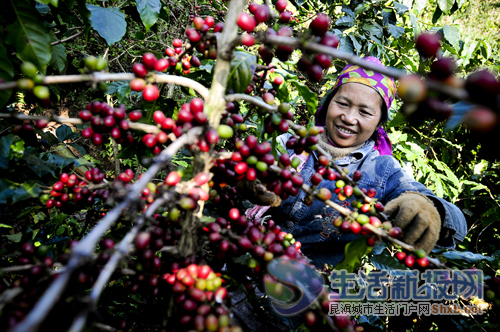
Coffee has made Dakaihe Village rich, attracting many migrant workers during the harvest season.
There are three kinds of brewed coffee on a long table. Jeremy Wakeford, a tasters of Starbucks Global Special Cup, gently scoops a spoon out of a bowl, smells it on the side of his nose, then sucks it into his mouth and spits it out. Jeremy Wakeford is one of the world's top coffee consultants. This is the scene when he tasted coffee at Ai'e Company in Pu'er City on Feb. 2. He gave Pu'er coffee beans a high score of 81.5, saying Yunnan coffee is better than shoulder-to-shoulder Blue Mountain coffee.
Workers at Aiyi said that these magical masters can drink the smell of grass in the planting base from coffee, and Jeremy Wakeford also tells us that grass-flavored coffee is not good coffee. Coffee chain giant Starbucks, which owns 51% of the company, warned in October that the global supply of coffee beans was seriously threatened by climate change and that coffee would become a luxury in the future.
Climatologists have also warned that as a result of climate warming, the harvest of many top coffee bean planting bases around the world has plummeted and their quality has also been affected. Costa Rican coffee trees are beginning to wither or blossom ahead of schedule, and the coffee bean planting area here is 25% less than it was 10 years ago. Some of the mountain villages here provide the world with the best Arabian coffee beans for more than a century.
However, in Yunnan, the planting area and output of coffee beans are increasing year by year, and the land near the Tropic of Cancer is continuously providing the major coffee giants with fine small coffee beans, and even some recent rumors say that the price of coffee is rising year by year. Some tea farmers in Pu'er have cut down tea trees to grow coffee.
The relevant leaders of Pu'er city denied this, saying it was only a private act of a very small number of tea farmers. Hute, manager of Nestle's agronomy department, also said that China has a tea culture for thousands of years, and coffee, as an imported product that has only been introduced for more than a hundred years, is unlikely to have an impact on tea.
Dakaihe Village in Pu'er City has been growing coffee for more than 10 years, with more than 5 mu of coffee land per capita. Now 30% of the families here have pickups and cars. "I still like to drink tea. It's convenient. As soon as I soak in boiling water, I'm done. I don't like the bitter taste of coffee. " Villager Chen Bing said.
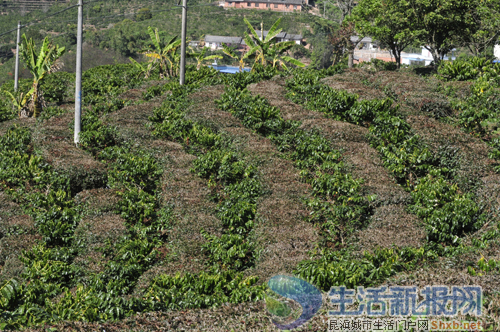
The villagers interplanted coffee trees in the tea field, where tea and coffee met.
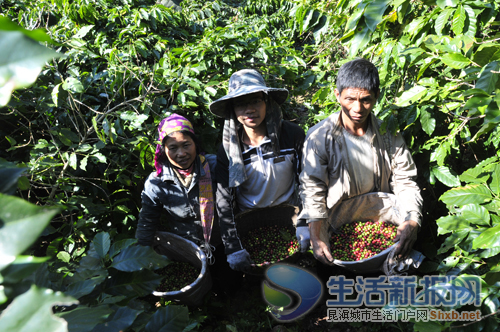
Cao Ying and his family of migrant workers
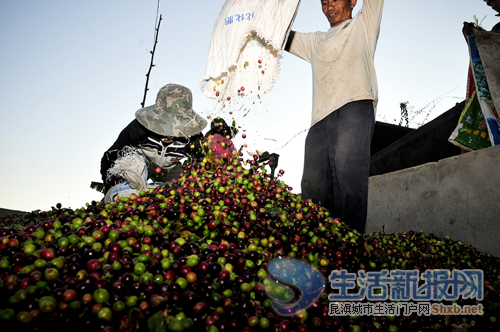
The worker poured the weighed coffee fruit into the collection pool
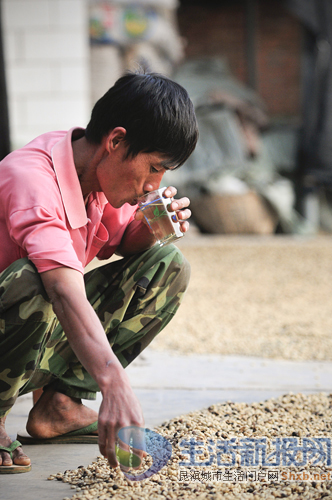
Drinking coffee is not uncommon in the village.
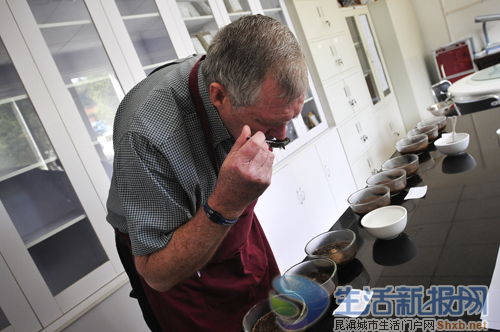
Starbucks Global Special Cup tasters scored a high score of 81.5 for Pu'er coffee beans a few days ago.
Jin Linwen, reporter of Life News / photo
China Coffee Trading Network: www.gafei.com
Important Notice :
前街咖啡 FrontStreet Coffee has moved to new addredd:
FrontStreet Coffee Address: 315,Donghua East Road,GuangZhou
Tel:020 38364473
- Prev

Helene: Boomerang Cafe is my child
Open the door of the coffee shop Boomerang and greet you not only by the aroma of bread and coffee, but also by a green-eyed Australian girl, Helene, the female owner of this small shop.
- Next

Why Koreans Drink Coffee
A South Korean employment website published a survey of 500 office workers asking them about their daily coffee consumption, and the results showed that more than 110 respondents said they drank at least four cups of coffee a day, accounting for 21.9% of respondents.
Related
- Unexpected! Ruixing Telunsu lattes use a smoothie machine to foam milk?!
- % Arabia's first store in Henan opens into the village?! Netizen: Thought it was P's
- Does an authentic standard mocha coffee recipe use chocolate sauce or powder? Mocha Latte/Dirty Coffee/Salty Mocha Coffee Recipe Share!
- What is the difference between Vietnam egg coffee and Norway egg coffee? Hand-brewed single product coffee filter paper filter cloth filter flat solution!
- What is the difference between sun-cured and honey-treated coffee? What are the differences in the flavor characteristics of sun-honey coffee?
- How to make Italian latte! How much milk does a standard latte use/what should the ratio of coffee to milk be?
- How to make butter American/butter latte/butter Dirty coffee? Is hand-brewed coffee good with butter?
- Is Dirty the cold version of Australian White? What is the difference between dirty coffee/decent coffee and Australian white espresso?
- Relationship between brewing time and coffee extraction parameters How to make the brewing time fall to 2 minutes?
- Got entangled?! Lucky opens a new store, Mixue Ice City, and pursues it as a neighbor!

